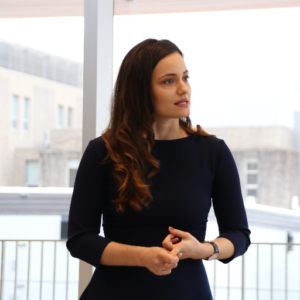PhD, Public Health Sciences, Washington University in St. Louis; MSc, Epidemiology, Queen’s University; BHSc, Health Sciences, Western University

Luissa Vahedi
Dr. Luissa Vahedi is a social epidemiologist who specializes in the application and advancement of mixed-methods research to address global health disparities. Her scholarship addresses the socio-political causes and health consequences of social inequalities, violence, and child development disparities. Dr. Vahedi joins the Faculty Social Work at the University of Toronto as a SSHRC-funded postdoctoral scholar who is working with Professor Carmen Logie from October 2024 to September 2026. A synopsis of the research project she is leading is below:
Project: The Temptation to Categorize: Interrogating Unintended Consequences of the “Fragile State” Concept During an Era of Crisis
The world is grappling with co-occurring and interacting risks that limit human potential: inflation, war, climate change, and forced displacement. In 2023, the United Nations warned of a “universal lack of progress” in reaching global targets for peace and prosperity. International organizations are also drawing attention to the fragility of low-and-middle countries (LMIC), noting that these ‘fragile countries’ have core weaknesses that inhibit their ability to address global risks and thus threaten global peace/prosperity. Although all countries are facing the double burden of global risks and weakened trust in government, the ‘fragile’ label is exclusively applied to LMIC. The language used to categorize countries as ‘fragile’ reflects power hierarchies that, if left uncontested, can stigmatize countries and limit global progress.
This era of interacting global risks is an opportunity to innovate the international conversation on ‘fragility’. This research systematically reviews and critiques approaches used to categorize LMIC as ‘fragile.’ In doing so, this work distills the (1) central characteristics of fragility that are applicable to all countries, (2) processes through which fragility is socially/politically produced, and (3) limitations of the current fragility concept. This work strengthens Canada’s efforts in championing liberal values (freedom, justice, tolerance) both domestically and internationally and proposes a new way for Canada to re-conceptualize fragility within the context of intersecting crises.